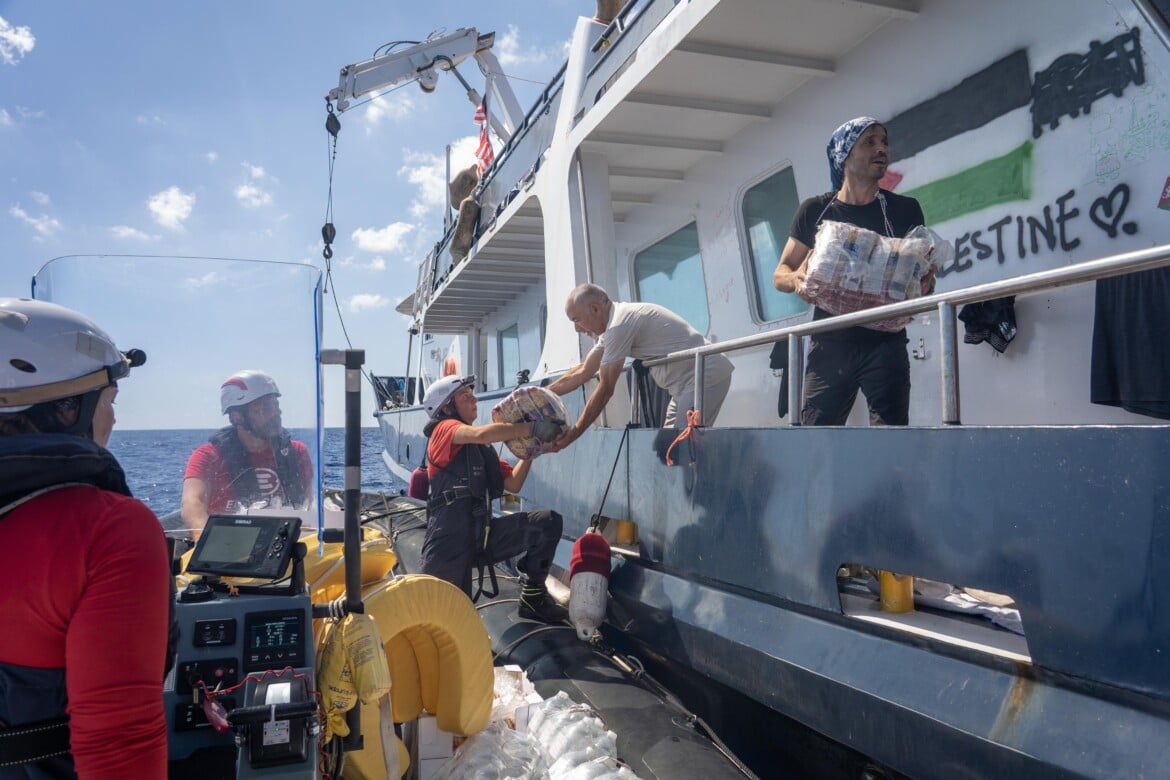Reportage
Aboard the flotilla: Explosions, drones, and ABBA on the radio
The small quadcopters with flashing red lights have become a familiar presence. But tonight, there are more of them, and they are flying much lower. And they are no longer just observing – they are attacking.

Mamma mia, here we go again. The ABBA track takes over the radio frequency used by the Global Sumud Flotilla, temporarily jamming communications between the 40 boats in the humanitarian fleet headed for Gaza. The drone attack has just begun. It is the third and largest since the mission left Barcelona at the end of August.
It’s just after 11:30 p.m. on Tuesday, and the boats are sailing in international waters with the island of Crete in sight. For at least half an hour, a large swarm of drones has been hovering over the flotilla. The small quadcopters with flashing red lights have become a familiar presence, circling over the crews’ heads for three nights now, to the point that they almost pay no mind to them anymore.
But tonight, there are more of them, and they are flying much lower. And they are no longer just observing – they are attacking. The first incendiary device is dropped on the sailing vessel Owhaila. Its crew, a collective of anti-war U.S. military veterans, is not caught by surprise. They execute a zigzag maneuver and manage to avoid a direct hit.
They describe an incendiary projectile similar to those that struck the ships Family and Alma two weeks ago in the port of Sidi Bou Said, Tunisia. On that occasion, Israeli propaganda tried to deny the evidence, spreading stories about signal flares fired by the activists themselves. But now, the gloves are off against what official Israeli government communications have dubbed “the Hamas flotilla.” After the Owhaila, the Yulara is targeted. A drone drops a chemical substance that hits Youssef Sammour in the face, causing a strong burning sensation but no serious injury.
In recent days, Sammour had told il manifesto that he was ready to accept all the risks of this mission. A Palestinian man who grew up in New Zealand, he had participated in two previous naval missions to break the Gaza blockade. On both occasions, he recounted, “my family and my crew convinced me to leave the boat before the last leg of the voyage, because of the greater danger I would be facing as a Palestinian.” But this time, he said, “my body, my mind, my heart, my nervous system are telling me to go all the way.” The Yulara’s crew described the chemical as having an extremely unpleasant odor, and based on the irritation it caused on Sammour’s skin, there was speculation it could be hydrogen sulfide.
After the firebomb and the chemical attack, the loud explosions began. From the sailboat Hio, hosting il manifesto’s reporters, at least 15 booms were heard, some closer than others, accompanied by bright flashes and thick columns of smoke. The Hio was left unscathed by these percussive blasts, but five other boats were hit. The Zefiro suffered the most serious damage, with a strike to its main mast. The main sail of the Morgana, a 14-meter boat carrying the flotilla’s Italian spokesperson, Mariaelena Delia, along with Five Star Movement senator Marco Croatti and AVS MEP Benedetta Scuderi, was torn.
Scuderi assured il manifesto that the Morgana will continue its voyage: “We will have to proceed under engine power, but the crew is determined. There are people on board who have already faced very difficult situations. They are giving us great support.”
The attack lasted almost four hours. The explosions, initially close together, grew less frequent until they stopped around 3:00 a.m. At one point, a boat issued a mayday call, requesting help from the Greek coast guard. No help ever arrived. Flight tracking data shows that a drone from the European border agency, Frontex, flew over the area. Late in the night, Frontex dispatched a Portuguese ship to the scene, which found “no material damage to the boats,” according to a subsequent press release.
In meetings the following day, the Flotilla decided to continue sailing at a reduced speed of three knots to remain close to the coast of Crete throughout the night. Organizers expected a second, more violent night of attacks but had no faith in protection from the Greek state. The boats were to stay just inside the limit of Greek territorial waters: within Greece’s jurisdiction and close enough to seek refuge in an emergency.
As evening fell on Wednesday, the sea, previously calm, swelled with meter-high waves. Darkness set in, and the drones reappeared. Nevertheless, from the ship Alma, we got an optimistic statement from Nkosi Zwelivelile Mandela, a South African MP and grandson of the great leader Nelson Mandela: “The tide of international solidarity has taken a positive turn, and decades of internal resistance and the sacrifices of generations of Palestinians have exposed the crimes against humanity of the Zionist entity. This entity is now unmasked before global public opinion, and it is only a matter of time before its criminal leadership is called to account.”
Originally published at https://ilmanifesto.it/gli-abba-nella-radio-ed-esplosioni-dal-cielo-avvertita-la-flotilla on 2025-09-25
